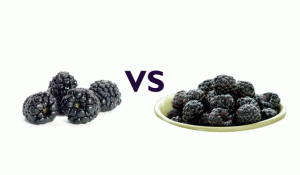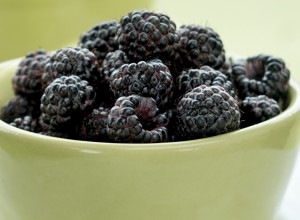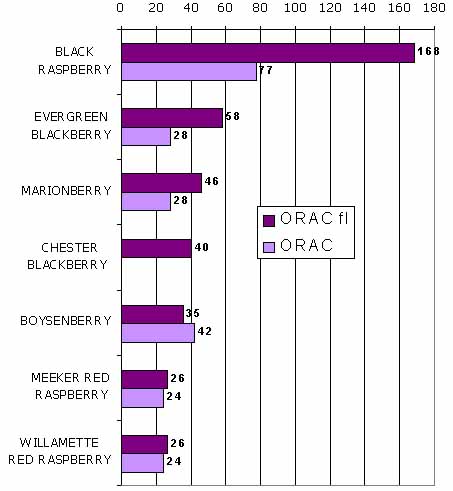The Difference Between Black Raspberries and Blackberries

A friend pointed out to us a few months ago there was a drink on the market that claimed to have black raspberries in it. He then showed us the list of ingredients. It contained a blackberry concentrate but no black raspberries! Every week or two we come across an article on black raspberries and sure enough, there is a picture of a blackberry there instead. If you look closely at the labels for black raspberry products, they either use other berries, or have a picture of the incorrect berry, which only adds to the confusion. Black raspberries and blackberries even come from the same genus and family (fancy plant-speak for being genetically similar), so it is no wonder they get mixed up all the time.
We have talked to many companies and nutritionists that believe that these two very different berries are one and the same. Nobody is at fault here, it’s just that the black raspberry hasn’t had much of a chance to speak up for itself on the big stage yet. Luckily for the black raspberry, we will gladly take the microphone and by the time you are finished reading this, telling the difference between these two berries will be as easy as looking at them.
[one_half]
Physical Description: Usually a rather large berry with larger single cells that bulge out more significantly than a cell would in a black raspberry. These berries contain the “plug” where the stem attaches to the berry and because of that are not hollow like a black raspberry. The berry appears to be glossy than a black raspberry due to larger protective hairs.
Taste: Less tart than a red raspberry, but also much sweeter.
Health: Blackberries are healthy for you in their own right, but do not contain nearly the same levels of antioxidants and anthocyanins as black raspberries. They have high levels of natural sugars, which can be an issue for some, and they haven’t been studied to the same extent as black raspberries.
[/one_half]
[one_half_last]
Physical Description: A small, black-colored raspberry with very small white hairs. Known by farmers as a “blackcap” due to the berry coming clean off the bush without a plug, making it hollow inside. The individual cells of the berry are small and do not protrude very far out from the berry.
Taste: More fruity and less tart than a blackberry. Also contains less sugar so is not as sweet. Has a very unique taste that is not really similar to any other berry.
Health: Black raspberries are one of the healthiest berries on the planet. They are lower in sugar than most berries and also contain a lot of fiber (around 8 grams per cup). They contain large amounts of anthocyanins, and around three times the antioxidants found in blackberries. They are also one of the most well-researched berries, especially in the area of cancer prevention.
[/one_half_last]
Check out this comparison graph that uses ORAC (a way of measuring antioxidant capacity) of different caneberries from Oregon State University Food Science:
Quick checklist:
- Is it hollow?
- Is it about the size of your thumbnail?
- Is it make up of small fruit cells?
If you answered yes to those three questions, you probably have found the rare black raspberry! If not, you still have a tasty berry, but it is most likely a blackberry.
Posted on: January 15, 2013, by : Brian3,990 thoughts on “The Difference Between Black Raspberries and Blackberries”
Comments are closed.




Thank you so much for this information. My husband bought a house with a large backyard in the winter. Someone had been living here for the past 5 years and hadn’t taken care of any of the plants. It appears whoever lived here in the past was quite the fruit person though as we have apples, cherries, blackberries, and mulberries. I thought that the huge patch of berries I just picked were early blackberries but my friend pointed out that they were black raspberries. They taste wonderful and we have thousands. Thanks for helping confirm that is what they are.
Great article and good illustrations. Short and to the point.
Thank you! I was just looking to figure out the difference and this described it perfectly! My husband and I were out picking berries in our park, and wondered why we had two different types of berries that were both black – turns out this was the two berries! Thank you!
We have several places in the wilds of Vermont where we go to pick wild blackberries.
My brother cultivates black raspberries (blackcaps) that he transplanted from my parents back yard.
Is it fair to say that blackberries grow primarily in the wild and that most yard blackberries are black raspberries/blackcaps?
Also, on a visit to the Portland Oregon area I was impressed with the frequency of black raspberries growing all over golf courses and in the highway medians and along the edges of the roadways.
Thanks for the info. I will have a freezer full buy the end of the season they are all over my property. Thought they were just little blackberries. Now i know. Now to find a jelly recipe.
My parents grew both red and black raspberries in WV. I loved the black ones which mom would can. They open a jar and warm the berries and juice and put over a slice of buttered slice of toast from homemade bread. She would also sweeten slightly and put over homemade ice cream.
I keep looking for black raspberries but have been unable to fine any. Will try ordering online.
Thanks !
I bought raspberry plants two years ago . This is the first year they produced any fruit and I was very surprised when the fruit was a black color. Some of the berries are red ( not ripe). The ripe berries are all black. I do not see any berries that are both red and black. I was very confused about the berries. thanks again.
We have many black raspberries growing on our property. I also think we have blackberries but here’s the rub: they come off the plant hollow. Other than that they fit the description of blackberries and are observably different from the black caps in look (bulging cells, glossy appearance) how they ripen (whole floret at once) and how they taste (less tart and more sweet). Does the simple fact that they came off hollow mean they are black caps or could it just be that they were ripe enough to harvest that way?